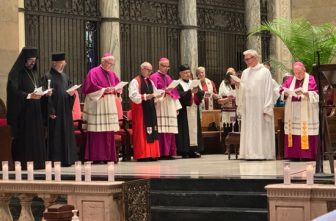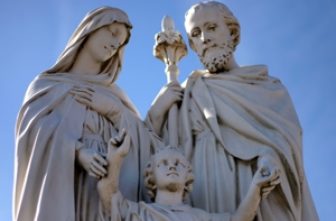In my day job, I serve as managing editor to “Logos: A Journal of Catholic Thought and Culture.” It’s an academic quarterly, interdisciplinary in nature, and our readership spans the globe.
In our current issue, I was delighted to meet a remarkable spiritual thought leader, especially for Catholic youth of the last century in Germany, Ida Friederike Görres (1901-1971). We are printing a new translation of “Trusting the Church,” a prescient talk she delivered post-Vatican II when the Church in Germany was reeling in change, along with the eulogy from her funeral given by Cardinal Joseph Ratzinger, the future Pope Benedict XVI, who called her an irreplaceable and fearless voice for the Church.

Görres was the sixth child of an Austrian diplomat and Japanese mother, and her early life was marked by a deep loneliness and lovelessness. But her ardent involvement in the Catholic Youth Movement set her on a course to become one of the century’s more prolific and fiery voices in support of Catholicism. She once said, since sadly she did not have children of her own, that “All my strength … has been focused on the Church.” Thus, did she become a kind of formidable “Church mother.”
Like so many of her time, she lived through the Second Vatican Council with “joyful attention,” but she found the consequences ambiguous. “She instinctively saw that which is indispensable in limbo.” And yet, her message was one of unyielding hope. The words of her lecture in 1971 bear a kind of timeless promise:
“(The Church is) the great, the whole, the long-lived, immortal on earth, the one that is identical with her own beginning … in spite of all the fashionable concerns about this terrifyingly weighty discourse of older theology, (the Church) is nevertheless the ‘continually living Christ’ who speaks and responds to us in the Church as the place of His grace, as His custodian. The recipient of that rock-solid trust of our fathers is still the same one. … It is not a system, an idea, an ideology, a structure, a society, but the tremendous living establishment, which has existed since the apostles until today, fulfilling her history from century to century, growing, unfolding, struggling, ailing, recovering, living out her destiny and maturing toward the return of the Lord.”
The forthcoming election feels weightier than any other of my life. We stand at the crossroads of revolution or renewal. One fed from rage, the other from repentance; one bent on destruction, the other on rebirth — and there is only one that will bring life, only one that is proper to the “tremendous living establishment,” the Church. Görres is especially timely in reminding us that the Church is “the continually living Christ,” and that the Church doesn’t “change with the times.” She is uninterested in approval ratings or in being chic. Instead, she will be true.
Görres writes: “I believe in God’s faithfulness. … I trust the Church’s tremendous powers of regeneration — they will be awakened when the need is at its greatest. Precisely because she is a poor bride in misery now, she is more at the mercy of His grace than ever.” She continues, “We must always pray … to defend that which is holy tenaciously, bravely, stubbornly, and at all costs. . . This courage must grow with darkness and threat.” Indeed.
Our Lady of the Americas, pray for us, that we will defend that which is holy with courage, tenacity, intelligence, compassion, and without fear. Amen.
Kelly is the author of nine books, including “Love Like a Saint” (2021). You can access the “Logos” article by Görres on her website, lizk.org.



